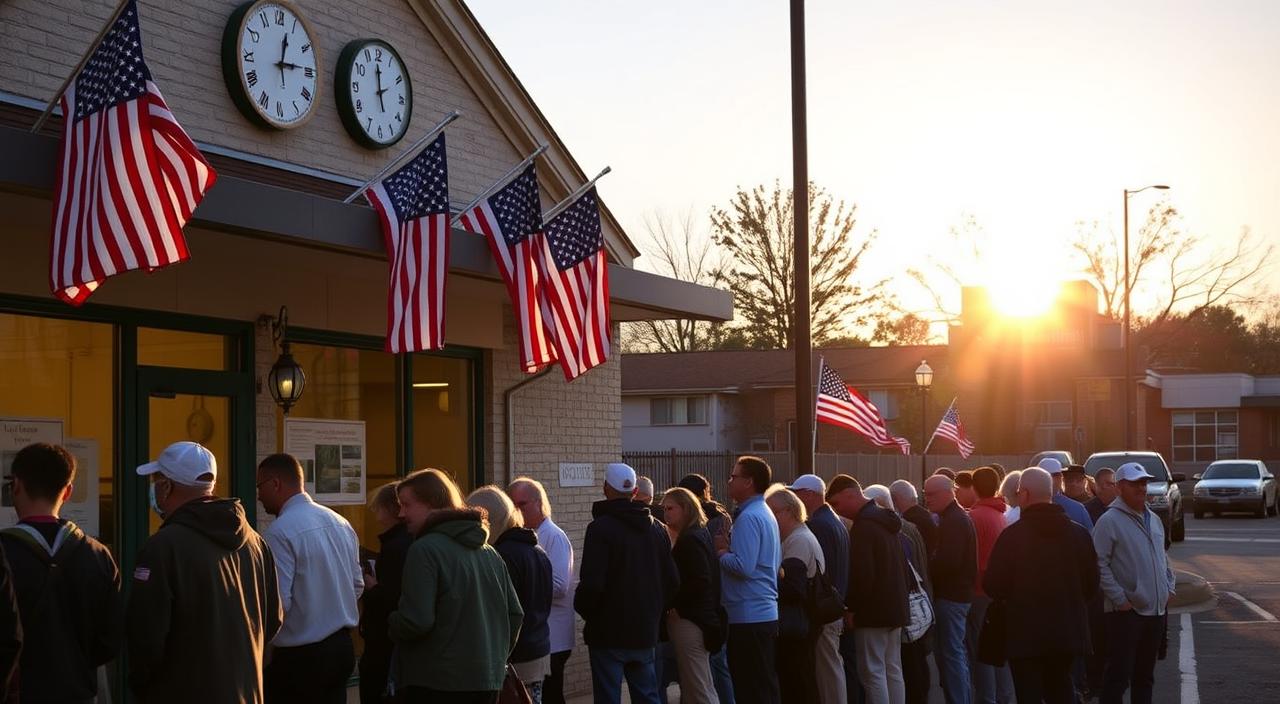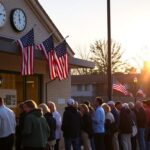As the nation prepares for another big election, many wonder, “When do polls open on Election Day?” The time can differ based on where you live. Yet, one thing is clear: your vote is important. The opening and closing of polling stations are key to letting every American have a say.
In the world of politics, where opinions often clash, I think about the value of voting. Growing up in this country, I’ve seen how voting can change lives. It’s a shared duty, no matter what party you support or what you believe.
Key Takeaways
- Voting hours on Election Day usually range from 6:00 AM to 8:00 PM local time. But, they can change by state and even county.
- Early voting and mail-in ballots are getting more popular. In some states, nearly 60% of voters cast their ballots early.
- How election results are reported can also vary. Some states can count early votes fast, while others can’t until Election Day.
- It’s important to know your local polling place, what documents you need, and your voting rights. This makes voting easier and more empowering.
- Whether you support a certain party or not, voting is a key part of our democracy. We must all value and protect this right.
Understanding Election Day Schedule Basics
On Election Day, polling stations in the U.S. usually open early and close late. But, the exact times can differ by state and even county. It’s key to check with your local election office for the exact times in your area.
Standard Voting Hours Across Time Zones
Polls generally open between 6:00 a.m. and 8:00 a.m. and close between 7:00 p.m. and 9:00 p.m. local time. For instance, in New York, polls open at 6 a.m. and close at 9 p.m. In California, they open at 7 a.m. and close at 8 p.m.
State-by-State Opening Times
Voting hours can change by state. Some states need a government ID to vote, while others accept other documents. Also, some states offer special ballots for those who can’t find their name on the list.
Early Morning Voting Options
Some states let voters cast their ballots early in the morning. Check with your local election officials to see if this is available in your area.
Knowing the voting hours in your area is vital. It helps ensure a smooth voting experience. By understanding the standard schedule and any local changes, voters can plan better and exercise their right to vote.
What Time Does Voting Start on Election Day
Voting on Election Day starts between 6:00 AM and 7:00 AM. This time varies by state and local rules. For example, in Florida, Eastern Time counties close polls at 7:00 PM, while Central Time counties close an hour later.
It’s important to check the start time for your local polling place. This can be different from the statewide times. Arizona might take up to 10 days to count ballots, while Georgia starts processing mail ballots on October 21.
Knowing your voting details helps make the process smoother. By understanding your local voting information, you can plan better. This way, you can fully exercise your right to vote.
“In the House, Democrats need to net just four seats to take control of the chamber.”
This election is critical, so knowing when to vote is key. Being informed and ready helps you make your voice heard. It’s a chance to shape the future of your community and the country.
Finding Your Local Polling Place Information
As Election Day gets closer, knowing where to vote is key. You can find this info on state or local election websites. Just type in your address to find your voting spot.
How to Locate Your Designated Voting Location
Visit your state or county election website to find your polling place. They have tools like “Voter Lookup” or “Polling Place Finder.” You can also use interactive maps or download sample ballots from local offices.
- Tony Pollard: Cowboys Running Back Stats and Highlights
- Week 9 Fantasy Rankings: NFL Players To Start & Sit
Required Documentation for Voting
What ID you need to vote varies by state. Usually, a photo ID like a driver’s license is required. Check your state’s rules early to make sure you have the right ID.
Accessibility and Special Accommodations
Many polling places have features for voters with disabilities. This includes curbside voting and large-print ballots. Contact your local election office to learn about these options at your polling place.
Knowing your voting location, what ID you need, and accessibility options makes voting easier. This way, you can have a smooth voting experience on Election Day.
Early Voting and Mail-In Ballot Options
As the election gets closer, many states offer early voting and mail-in ballots. These options make voting easier and more convenient. In some places, most votes are cast before Election Day.
In Florida, for example, almost 60% of voters had cast their ballots early. This shows how popular these options are.
The rules for mail-in ballots vary by state. Some need the ballot to arrive by Election Day. Others accept it if it’s postmarked by then, even if it arrives later. It’s important for voters to know their state’s absentee ballot deadlines.
Early voting times also change from state to state. Some offer it weeks before the election. Voters should check their voting times to find the best option for them.
“Expanded early voting and mail-in ballot access have become critical. They help ensure all eligible citizens can vote, even during the pandemic.”
Voters should plan ahead, no matter if they vote early or by mail. Knowing the rules and deadlines helps them make their voices heard. This way, they can fulfill their civic duty with confidence.
Election Day Voting Process and Requirements
As voters get ready for Election Day, it’s key to know the voting process. Each state has its own rules to make sure elections are fair and safe. These rules cover things like voter ID and checking if you’re registered.
Voter ID Requirements
Voter ID rules change a lot from state to state. In places like Texas and Georgia, you need a photo ID. But in Colorado and Oregon, you can use other kinds of ID too. Make sure you know what ID is okay in your state before you go vote.
Registration Verification Steps
How you check if you’re registered to vote can vary. In some places, you do it at the polling station on Election Day. In others, you do it before. Always check if you’re registered and have the right papers ready.
Voting Rights and Regulations
Rules on voting rights help make sure everyone can vote fairly. But these rules can be different in each place. It’s important to know what’s needed, like what ID to bring and when polls are open.
Knowing the election day polling place hours, voter information, and voting process rules helps make voting easy. Being informed and ready lets you vote with confidence.
“Voting is the foundation stone for political action.” – Martin Luther King Jr.
Special Circumstances and Extended Hours
Most polling places follow standard hours on Election Day. But, some might stay open longer due to special reasons. This could happen if there are long lines or technical problems, making sure everyone can vote.
In some states, voters with registration issues can use provisional ballots. The rules for these ballots differ by state. Sometimes, voters get extra time to fix their ballots after Election Day.
- Polling places may extend hours due to long lines or technical difficulties
- Provisional ballots may be available for voters with registration issues
- Rules for counting provisional ballots can vary by state
- Some states allow extra time after Election Day to address ballot issues
Voters need to know about polling hours, voting times, and election day rules in their area. These can change due to special situations. Knowing their rights helps voters make sure their voices are heard.
Conclusion
Knowing about election day voting information, voter information, and polling place hours is key. It helps you take part in democracy. Check with your local election office for the latest on polls, what you need to bring, and any special rules.
Early voting and mail-in ballot options give you more choices. But, election day is special for many. Knowing how to vote and having the right info lets you have a say in the country’s future.
As voting rules change, it’s up to all voters to stay informed. Voting is how Americans keep democracy alive. It’s how we choose our leaders and guide the country’s path.
FAQ
Q: What time do the polls open on Election Day?
A: Polls open between 6:00 AM and 7:00 AM local time. This is true for most places in the United States.
Q: What time do the polls close on Election Day?
A: Polls usually close between 7:00 PM and 8:00 PM local time. This is the case for most areas.
Q: Are the voting hours consistent across time zones?
A: Yes, voting hours are mostly the same across time zones. Polls open early and close in the evening. But, specific times can change by state or county.
Q: Are there any early morning voting options on Election Day?
A: Yes, some states have early morning voting. This is for people with different schedules.
Q: How can I find my designated polling place for Election Day?
A: You can find your polling place on your state or local election office websites.
Q: What documentation do I need to bring to the polls on Election Day?
A: You’ll need a form of identification. This can vary by state.
Q: Are there any accessibility features or special accommodations available at polling places?
A: Yes, many places have features for voters with disabilities. It’s good to check what’s available before you go.
Q: Can I vote early or by mail-in ballot?
A: Yes, many states let you vote early or by mail. The deadline for mail-in ballots changes by state. Some need it by Election Day, others by postmark.
Q: What are the voter ID requirements in my state?
A: ID requirements differ by state. Some need a photo ID, others accept non-photo ID.
Q: What happens if I encounter an issue with my registration at the polling place?
A: If you have a registration issue, you might get a provisional ballot. The rules for these ballots vary by state.
Q: Can polling places offer extended hours under special circumstances?
A: Yes, some places might stay open longer. This is if there are long lines or technical problems.

My name is Jakir, I am a content writer, content creator, I give business, sports, finance, trending news and I have 10 years of experience in this and this is my blog goldennews24.com.










